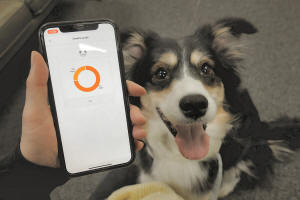South Korean firm's smart dog collar tells owners what's in a bark
 Send a link to a friend
Send a link to a friend
 [January 12, 2021]
By Minwoo Park [January 12, 2021]
By Minwoo Park
(Reuters) - A South Korean startup has
developed an AI-powered dog collar that can detect five emotions in
canines by monitoring their barks using voice recognition technology.
The Petpuls collar can tell pet owners through a smartphone application
if their dogs are happy, relaxed, anxious, angry or sad. It also tracks
dogs' physical activity and rest.
"This device gives a dog a voice so that humans can understand," Andrew
Gil, director of global marketing at Petpuls Lab, told Reuters.
The company began gathering different types of barks to analyse dogs'
emotions in 2017. Three years later, they developed a proprietary
algorithm based on a database of more than 10,000 samples from 50 breeds
of dogs.

"I thought she was just happy when she played and felt sad and anxious
when I wasn't home...actually she felt angry when she lost a game she
played with me, like how humans feel," said Moon Sae-mi, who has a
six-year-old Border Collie.
The collar has a 90 percent average accuracy rate of emotional
recognition, according to Seoul National University, which tested the
device the company says is the first of its kind to be powered by AI
voice recognition technology.
Petpuls Lab started marketing the collar online in October last year at
$99.
[to top of second column]
|

Moon Sae-mi tries out Petpuls, an AI-powered smart dog collar, with
her dog Godot during a demonstration in Seoul, South Korea, January
11, 2021. Picture taken on January 11, 2021. REUTERS/Kim Hong-Ji

The global pet care market was worth $138 billion in 2020, up 34
percent, Euromonitor data showed, as more people spent time at home
with their pets or adopted pets during the COVID-19 pandemic. The
global dog population also grew 18% the same year to 489 million.
"More people began to adopt dogs, but unfortunately some of them
abandoned their dogs due to miscommunication," Gil said. "Petpuls
can have an important role in the pandemic...it helps owners
understand how dogs feel and increases their bonding."
(Reporting by Minwoo Park and Daewoung Kim; Editing by Jacqueline
Wong)
[© 2021 Thomson Reuters. All rights
reserved.] Copyright 2021 Reuters. All rights reserved. This material may not be published,
broadcast, rewritten or redistributed.
Thompson Reuters is solely responsible for this content.
 |